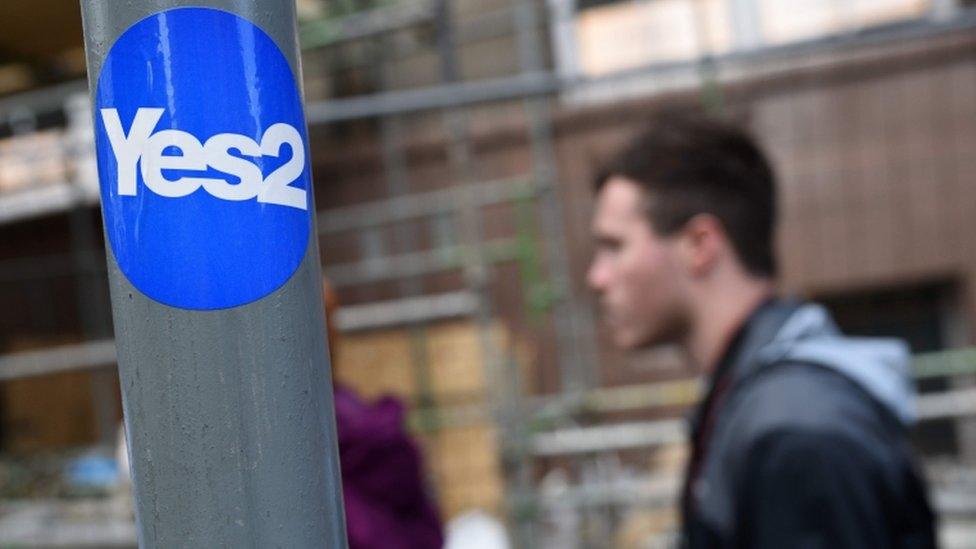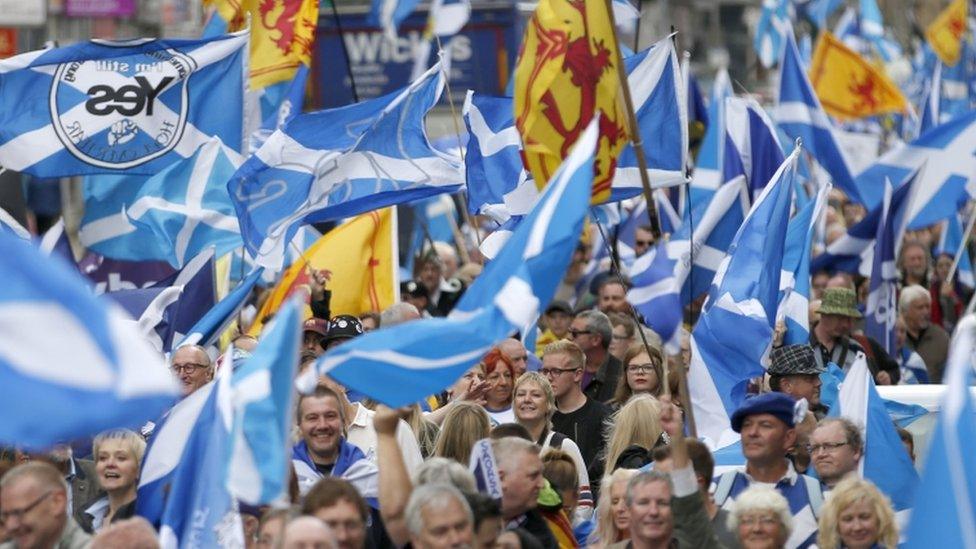Scottish independence: Sturgeon launches 'new conversation'
- Published
The first minister said it was right to keep the option of independence on the table
Nicola Sturgeon has launched a "new conversation" on independence as she urged Scotland to "control its own destiny".
In a speech in Stirling, Ms Sturgeon acknowledged that choosing independence would be a "big decision" in the wake of the Brexit vote.
She said there would be many issues for people to weigh up, and she did not presume the case has yet been won.
But she said it was right to keep the possibility on the table.
Opposition parties have urged Ms Sturgeon to focus on her "day job" of running Scotland, arguing she should be looking to improve public services such as education and the NHS instead of pushing for independence.
They have also suggested that Scotland's £15bn public spending deficit should act as a reality check for those calling for a second referendum.
Ms Sturgeon said every poll taken since the Brexit vote had shown support for independence was higher than it had been in the 2014 referendum, when voters backed staying in the UK by 55% to 45%.
She added: "And while I take nothing for granted, I suspect support for independence will be even higher if it becomes clear that it is the best, or the only way to protect our interests."
She said there was a "democratic deficit" at the heart of the Westminster system, and the fundamental question was whether Scotland should control its own destiny as a country, or "will we always be at the mercy of decisions taken elsewhere?"
Ms Sturgeon said the UK that Scotland voted to stay a part of two years ago had changed, and so too had the arguments for and against independence.

Many grassroots independence supporters are already pushing for a second referendum
She said: "Before we start talking, we must listen. So today we are launching, as the first phase in our new campaign, the biggest listening exercise in our party's history.
"It will run from now until St Andrew's Day (30 November). We want to understand in detail how people feel now about Europe, Brexit and independence.
"We want to know the concerns that people have and the questions that they want answered. We want to build, if we can, a consensus on the way forward".
'Hitting the doorsteps'
Ms Sturgeon said members of the public could take part through a dedicated website, external, and all 120,000 SNP members would be sent a "pack of survey cards" which they would ask five people a month for the next three months to fill in.
All of the party's MPs and MSPs have been instructed to hold town hall meetings, and the SNP will establish a growth commission headed by its former MSP Andrew Wilson, who is a founding partner of the Charlotte Street Partners communications agency.
The commission will look at the prospects for Scotland's economy and also consider key issues such as currency.
The first minister added: "Our activists will be hitting the doorsteps as well, asking people to take part and delivering a new leaflet explaining why.
"All in all, we plan to talk to at least two million people across Scotland between now and 30 November. The wealth of information and insight we gather will then inform the next stage of our campaign".

Analysis by BBC Scotland political editor Brian Taylor
Ms Sturgeon - and her predecessor Alex Salmond - have repeatedly argued that the independence cause requires more, much more than SNP fervour. Both believe that, if zeal were enough, Scotland would have been independent decades ago.
So the FM's message today - as at the March conference when she first signalled the summer campaign - was that the advocates of independence must patiently answer the concerns and worries of voters. They must listen, not lecture.
Which is why I categorise today's announcement as a manoeuvre. It is emphatically not an immediate gung-ho propaganda push for independence.
It is not the starting pistol on a new referendum campaign. It is not the comprehensive rewriting of the independence White Paper. For one thing, this is a party initiative, not a government one. Rather, it is tentatively preparing the ground, should a referendum be sought and attempted.
Ms Sturgeon is cautious about a referendum. She wonders whether folk will heed the argument advanced by the Conservatives and others that indyref2 would simply pile problems upon existing uncertainty.
Yes, the SNP can say that it was the Tories who created the challenge by calling an EU referendum. But that is fighting a past battle, rather than addressing voters' contemporary concerns. So she ponders the public mood.

Ms Sturgeon had been cheered by supporters when she announced plans for a summer initiative to boost support for leaving the UK at the SNP conference in March.
And she said immediately after the UK voted to leave the EU that a second independence vote was "highly likely".
But the small number of opinion polls since the EU referendum have suggested she could not yet be certain of securing a majority in favour of independence despite the Brexit vote.
Two recent YouGov polls - the latest of which was published in the Times on Friday morning, external - have suggested a narrow majority of people remain in favour of staying in the UK, with support for independence put at 47% and 46% respectively.
Some senior SNP politicians have cautioned against rushing into a fresh referendum, with former education secretary Alex Neil, external recently calling for Ms Sturgeon to wait until there is a "decisive and evident shift in support for independence over a sustained period of time".

Thousands of independence supporters marched through Glasgow in July
In a letter to the Scotsman newspaper, external, business figures including former CBI Scotland head Sir Iain McMillan and former Scottish Enterprise chief executive Jack Perry said they were concerned about the SNP's new initiative on independence.
The letter argues that the move would "only add fresh uncertainty to Scotland's future at a time when small and large businesses are looking for stability".
They urged the Scottish government to instead focus on "improving our education system and skills, creating a sustainable NHS, and supporting economic growth in Scotland."
Scottish Conservative leader Ruth Davidson said Ms Sturgeon's speech had shown she was "prepared to ignore the priorities of the people of Scotland, in pursuit of her own narrow nationalist agenda."
Ms Davidson added: "If she was really listening, she would know that most of us don't want to go back to another divisive referendum debate - we want Scotland to move on."
'Pretending to listen'
Scottish Labour leader Kezia Dugdale said: "Instead of reforming education to give our young people the skills they need to compete for the jobs of the future, Nicola Sturgeon is deciding to drag Scotland back to the arguments of the past."
And Scottish Liberal Democrat leader Willie Rennie claimed Ms Sturgeon was "only pretending to listen" as she had "already decided that independence is the answer to Brexit."
The Scottish Conservatives, Scottish Labour and Liberal Democrats are all opposed to holding a second referendum, meaning the SNP would likely need the support of the pro-independence Scottish Greens to get their bill through Holyrood.
But any referendum would also need to be approved by the UK government in order to be legally binding.
UK Prime Minister Theresa May said in July she was "willing to listen to options" on Scotland's future relationship with the EU, but appeared unwilling to consider a second referendum on independence.